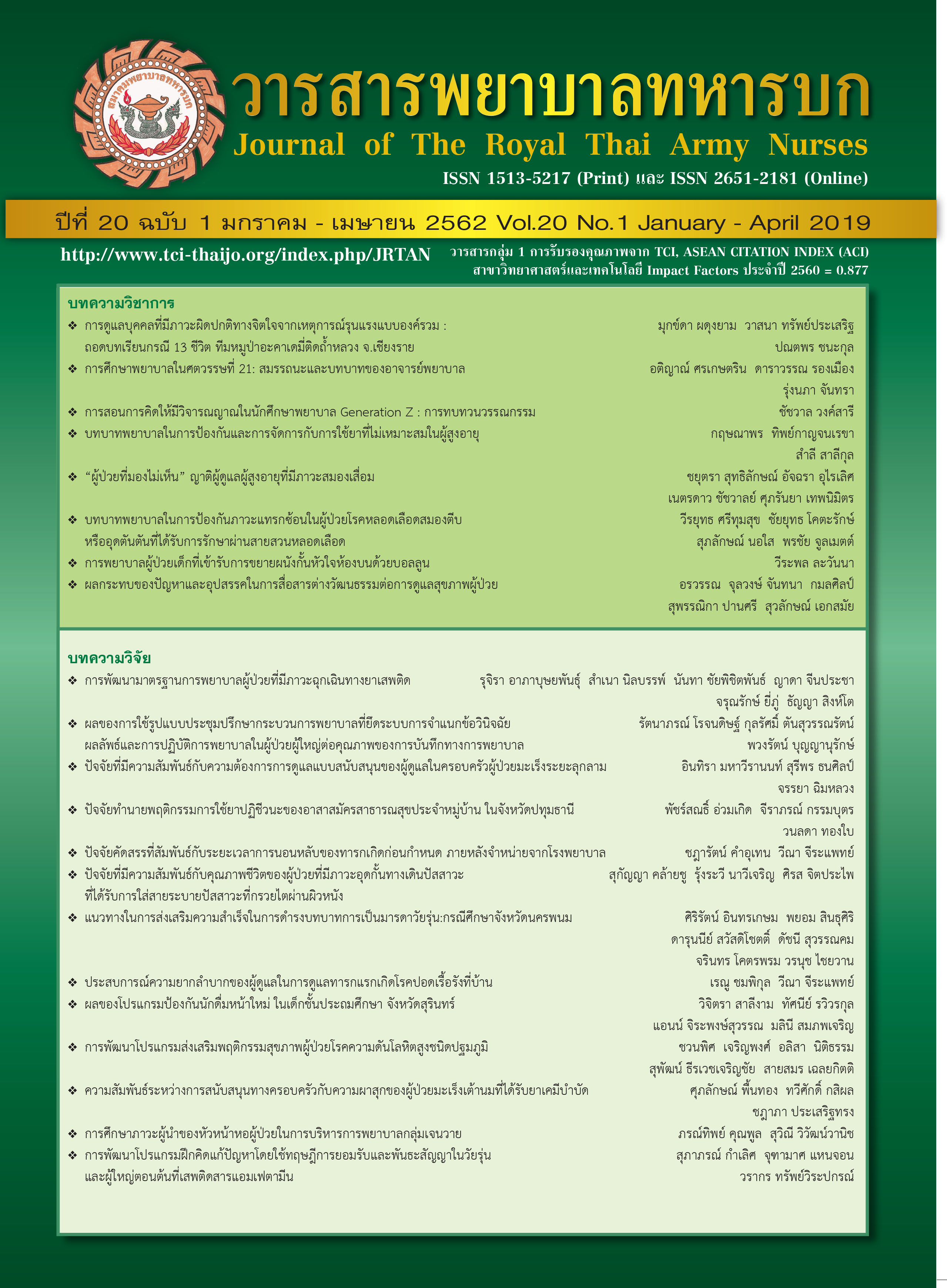Development Rehabilitation Model for Female Drug Dependent
Keywords:
female drug dependent, Development Rehabilitation ModelAbstract
The research and development aim to study and develop a rehabilitation for female drug dependent. The FAST Model for women was investigated then the result was integrated with reviewing the related literature. The comparison between the new model of the rehabilitation for women and the FAST Model was conducted. The participants for the current research comprised of the female drug dependent and their relatives. Each was separated into two groups, an experimental group and control. The data were gathered by a questionnaire. The statistics applied for analyzing data combined with content analysis content analysis, descriptive statistics, paired t-test, independent t-test, Chi-square, Fisher extract and Man – Whitney test. An alpha of 0.05 was used as the cut-off for significance. The result found that the FAST model still had weak points needed to be considered. Those issues were resolved and applied as a ground theory for developing the new rehabilitation model. In the experiment revealed that the self-esteem, the intention of preventing in relapse, and the satisfaction on treatment activities of the experimental groups were significantly higher than controls at .05. After one month of the following up, the abstinent rate in the experimental group is higher than control at .05. The relatives of the female patients in the experimental group moreover showed a better attitude toward the patients. The relatives showed better satisfaction in the treatment activities compared with control at .05.
Downloads
References
Haritawon N. Intra Drug Use Behavior of Drug Abuse Users in Thailand. Bangkok: Thammasart University; 2011. (In Thai)
Thanyarak Institute. FAST Model. Bangkok: Veterans Organization Printing Factory; 2003. (in Thai)
Arpabusayaphun R. Rehabilitation Model Development for Female Drug Users in Thanyarak Institute. Thanyarak Institute, Department of Medical Services. Pathumthani: 2008. (In Thai)
Terman, L.M., Tyler, L.E. Psychological sex difference In L. Carmichael,(Ed), Manual of child psychology. New York: Wiley; 1954.
Plubplachai T. Mindfulness Based Intervention for Reduction of Stress Reactivity in Patients with Alcohol Dependence: Evidences-Based Practice. Journal Psychiatric Association Thailand. 2013; 58 (2 ) 207-218. (In Thai)
Nilaban S. Development of Learning Activity Model to Reduce Repeated Drug Behavior of Methamphetamine Addicts. Pathumthani: Valaya Alongkorn Rajabhat University under the Royal Patronage; 2018. (In Thai)
Phukao D. Development and Evaluation of a Culturally Appropriate Treatment Program for People with Alcohol Use Disorders in Thailand. Queensland: Queensland University; 2006.
Sumnao N., et al. The Effect of Cognitive–Behavioral Therapy of in Rehabilitation Drugs User. Thanyarak Institute, Department of Medical Service, Pathumthani: 2013. (In Thai)
Sonlar K. The Effect of Mindfulness Training Program on Alcohol Craving of Inpatient Alcohol Dependence Receiving Detoxification Treatment. Bangkok: Chulalongkorn University; 2012. (In Thai)
Chaipichitpan N. Model Development for Rehabilitation in Meth-amphetamine Abuser: A Participatory Action Research. Pathumthani: Thammasart University; 2016. (In Thai)
Crouch M.A., Straub, V. Enhancement of selfesteem in adults. Family & Community Health: The Journal of Health Promotion & Maintenance 1983; 6(2), 65-78.
Bhumipat S. Social Psychology. Bangkok; Educational Technology Center, Sriphathum University, Bangkok; 1998. (In Thai)
Pinsupha P., Uthis P. The Effect of Family Motivation Interviewing Program on Alcohol Consumption in Schizophrenic Patients with Alcohol Drinking Problem. Journal of the Royal Thai Army Nurse. 2018; 19 (3): 213-220. (In Thai)
Downloads
Published
How to Cite
Issue
Section
License
บทความหรือข้อคิดเห็นใดใดที่ปรากฏในวารสารพยาบาลทหารบกเป็นวรรณกรรมของผู้เขียน ซึ่งบรรณาธิการหรือสมาคมพยาบาลทหารบก ไม่จำเป็นต้องเห็นด้วย
บทความที่ได้รับการตีพิมพ์เป็นลิขสิทธิ์ของวารสารพยาบาลทหารบก
The ideas and opinions expressed in the Journal of The Royal Thai Army Nurses are those of the authors and not necessarily those
of the editor or Royal Thai Army Nurses Association.






